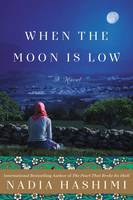The interviewer for this session was Marianne Elliott who had trained as a human rights lawyer. She worked in the area of advocacy and communications and Afghanistan was one of the many places she has worked. She recounts her time there in her book Zen under fire, and her experiences and empathy really helped make this session successful.
Nadia Hashimi wants to portray the "heroic women of Afghanistan rising above it all". The common portrayal is of an oppressed downtrodden group, meek and in the shadow of the men, hidden by the burka. Afghan women are a mystery - we start making our own assumptions aided by portrayals of the western armies going in to save them.
Nadia Hashimi was born in the USA but weaves the stories of her family into her stories. Many have been refugees and her book When the Moon is Low portrays a refugee story and was published before the recent refugee crisis. Ahead of her time on this issue, it had always been one that had affected her family and the people of Afghanistan.
She not only portrays women differently than the common view but her men too are often kind and romantic and opposed to brutal and paternalistic. She described romance as being a huge part of Afghan culture. Radio shows abound where people can call in anonymously and talk about their loves and relationships, she called it an obsession with romanticism and Bollywood movies are incredibly popular.
A House without windows describes the experience of Afghan women in prison. For some it is a complete erosion of their freedoms, for others whose lives are incredibly brutal it is a welcome refuge, there is no one to bother and harass them, they are fed and may even be able to go to literacy classes. The justice system is flawed and women are often imprisoned after false statements and for such crimes as running away from home. Both women described the frustration of working in the justice arena, but also acknowledged that there are some amazing people working in this area who are slowly trying to bring about change.
A question was asked about how we can best support Afghan women. Sending money can be risky as corruption is rampant. She suggested supporting the arts, Afghan women's writing projects and women's crafts, we can also read their blogs, listen to their stories and realise that these women are strong and resilient.





Add a comment to: An hour with Nadia Hashimi – WORD Christchurch